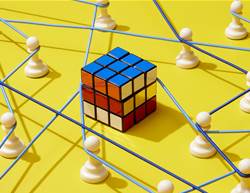You know, I feel like I'm an expert in ADHD and I have all these systems in place to help me manage the challenges. But then there was a week recently when I didn't have my medication and I just felt like, well, I've accomplished nothing.
Classic textbook ADHD is seeking stimulation because the brain doesn't generate enough dopamine, and the brain needs dopamine to stay focused and engaged. And so you do things to get dopamine, whether those are high-risk behaviors or exercising a tonne or flying from thing to thing to stay stimulated.
So I'm an adrenaline junky, which is common for people with ADHD. I struggle with over-commitment, and I tend to create almost my own nightmare with too many deadlines. I also wait until the last minute to get something done, because the fear that I won't finish creates adrenaline and that allows me to focus.
ADHD medication helps. But you also develop these systems or methods that allow you to get things done. I developed a lot of them when I was younger. I call them my whacky ways to learn. I get on a treadmill and I listen to 80s music like the Rocky theme, and I run to flood the brain with dopamine. That gets me pumped up, and then I can go write the article I need to write or whatever. It's like I have to manufacture focus. There was a study recently that showed ADHD people wait to be in the perfect mood to do something. And when you're in that perfect mood, you can get a lot done. I try to manufacture that mood.
When I have a bad week, the biggest thing for me is having a hard time managing the bombardment of life. I have a hard time being even and calm about things. That week I didn't have my medication, I couldn't sleep well. I was getting up at quarter of five every day, just because I was anxious about getting things done. My attention was always split. I was always aware of other things in the background. I could feel emails or texts coming in, and I was trying to do something else. And I can't shift from texts to going back to writing. I have to focus on one thing or I get overwhelmed and I just shut down. I just stop being productive, and my emotion regulation goes south.
That's a huge part of ADHD people don't talk about—the emotion regulation piece where emotions take over because you're worried about getting things done. Just overloaded. It could also manifest as overeating. I'd been on a great clip with exercise and eating, and wasn't able to stay on course that week and remember that my intention was to be healthier. Just the week before I'd been able to pause and say to myself I want to be healthier, so don't order takeout. But then I couldn't do that.
I can't be in someone else's brain, so I can't say what it's like if you don't have ADHD. But if you've ever had a head cold and you're hazy, or out of it, that's how some people describe ADHD. I'll find myself vacuuming, writing something and making soup at the same time. Just being pulled in so many directions. And then the soup will be burned, the vacuuming won't get done, the article I was writing won't get done. So the ability to remember my intention of what I wanted to do was lost. The unfinished projects element of ADHD is a big thing. I've learned to be a little maniacal about making lists and making sure I'm finishing things, because it makes me so anxious when things are left undone.
Anxiety is another aspect of ADHD. The underlying anxiety makes everything not enjoyable. It takes you out of the moment because you're worrying about something you need to do or finish. It makes it really hard to sit through a meeting or stay focused, not because you're bored, but your brain is saying I need to get this and this and this done. There's this cognitive hyperactivity, and your brain is just sort of circling the same topic.
This all may sound like something everyone experiences. But it's really the degree of the impairment that separates ADHD. We all procrastinate. But some people with ADHD haven't paid taxes in years. When there's not enough interest or enthusiasm, people with ADHD can't manufacture enough intention to get going. But it works the other way, too. If you have high levels of interest, then the brain gets flooded with dopamine and you can get a lot done.
Whenever I'm either over-tired or not clear on how to proceed, that's when I really struggle. I will worry and feel like I have to go and get certain things done, and so I'll just keep working, not eating or taking breaks, until I get it done. Sort of the other end of the spectrum from those with ADHD who procrastinate. I get things done, but it's hard for me to have balance. If I know I have something to get done, I'm very all or nothing.
So I'm a little different than the stereotypes in that way. But one stereotype that would definitely apply to me would be the hyperactivity and impulsivity, and difficulty engaging in leisure activities quietly. The idea of sitting on a beach for a vacation is torture to me. I have to be up doing things and having an agenda. To sit on a beach, I literally become jittery and annoyed and snarky and difficult.
The other thing is I have to keep everything in its place. If I don't, I will lose stuff. I get sort of annoying or obsessive with my family about putting keys back in the right place, because my history is of losing things. So I say, "please don't move that," or "leave that alone," because I know I could lose it. I'll just have no memory of what I did with something—almost like blacking out. So that's just another system I have now so I can keep track of everything.
The important thing to understand is that ADHD is a more complex disorder than people give it credit for. There's a phrase associated with autism that you've not seen autism until you've seen my autism. We need a phrase like that for ADHD, because you can't say with a broad brush, here is what ADHD is. It can be many different things, and there are different levels of impairment.
When I was a child I was very hyperactive and very disorganised and sloppy. But eventually, I learned that I could get things done by doing it differently than other people. That's a lesson I have to relearn all the time. ADHD medications helps, but the skill is not in the pill, we say. It's really about learning the methods and systems that work for you and that allow you to be productive and to get things done in your own way. I've had more than 20 years to get my strategies in place, but I still have those times when I struggle.









